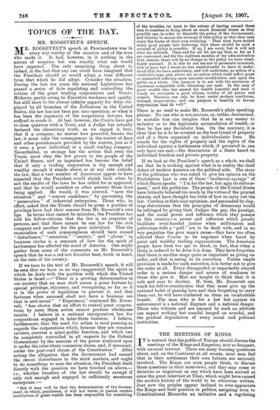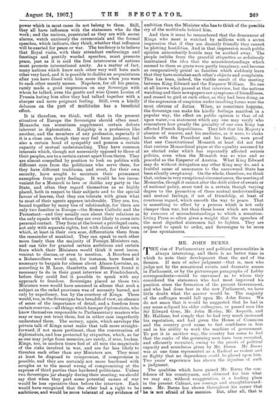THE MEETINGS OF KINGS.
IT is natural that the public of Europe should discuss the meetings of the Kings and Emperors, now so frequent, with unusual interest. There are many burning questions about, and, on the Continent at all events, most men feel that in their settlement their own futures are seriously involved. The Kings are sure, people think, to discuss those questions in their interviews, and they may come to decisions as important as any which have been arrived at since the great interview at Tilsit, which might have caused the modern history of the world to be otherwise written. Just now the peoples appear inclined to over-appreciate the Kings and their position in politics, assigning even to Constitutional Monarchs an initiative and a regulating power which in most cases do not belong to them. Still, they all have influence with the statesmen who do the work ; and the nations, penetrated as they are with secret alarms, watch anxiously the ceremonials and the formal speeches, which indicate, they think, whether that influence will be exerted for peace or war. The tendency is to believe that Royal visits, with their attendant embracings and feastings and prettily worded speeches, must promote peace, just as it is said the free intercourse of nations must promote international amity. As a matter of fact, many nations which know each other very well hate each other very hard, and it is possible to dislike an acquaintance after you have dined with him more than when you were to each other merely names. Napoleon, for all his genius, rarely made a good impression on any Sovereign with whom he talked, even the gentle and wise Queen Louisa of Prussia hating him after they had talked together with a sharper and more poignant feeling. Still, even a kindly delusion on the part of multitudes has a beneficial effect.
It is therefore, we think, well that in the present situation of Europe the Sovereigns should often meet. Monarchs can sometimes supplement certain defects inherent in diplomatists. Kingship is a profession like another, and the members of any profession, especially if it is a close one, though they may feel keen jealousy, feel also a certain bond of sympathy and possess a certain capacity of mutual understanding. They have common interests which, though not necessarily opposed to those of their peoples, are to a certain extent apart from theirs. They are almost compelled by position to look on politics with different eyes from the politicians who serve them, for they have different traditions, and must, for their own security, have sought to maintain their permanent exemption from party feelings. It would be too incon- venient for a Monarch to love or dislike any party in the State, and often they regard themselves as so highly placed, both in respect to their subjects and to the special favour of heaven, that they can tolerate with grace what to most of their agents appears intolerable. They are, too, bound together by many ties of relationship, for there are only two families in Europe—the Roman Catholic and the Protestant—and they usually care about their relations as the only equals with whom they are ever likely to come into personal contact. They form at the lowest a privileged caste, not only with separate rights, but with claims of their own which, at least in their own eyes, differentiate them from the remainder of mankind. They can speak to each other more freely than the majority of Foreign Ministers can, and can take for granted certain ambitions and certain fears which their Ministers would think it most incon- venient to discuss, or even to mention. A Bourbon and a Hohenzollern would not, for instance, have found it necessary to bargain for silence about Alsace-Lorraine, as, according to M. Laur, Gambetta and Bismarck found it necessary to do in their great interview at Friedrichsruh, before they could feel it possible to speak with any approach to freedom. Sovereigns placed as those two Ministers were would have assumed in silence that such a subject as the ceded provinces was of necessity barred, not only by expediency, but by the courtesy of Kings. There would, too, in the Sovereigns be a breadth of view, an absence of sense of the importance of detail, and a freedom from certain reserves,—all things which hamper diplomatists, who know themselves responsible to Parliamentary masters who may or may not trust them, but in either case imperfectly understand them. The secrecy, again, which envelops the private talk of Kings must make that talk more straight- forward, if not more pertinent, than the conversation of diplomatists, and less protected by etiquettes, which, so far as one may judge from memoirs, are rarely, if ever, broken. Kings, too, in modern times feel of all men the magnitude of the risks involved in war, and are far less likely to threaten each other than any Ministers are. They must at least be disposed to compromise, if compromise is possible, and they are certainly not more burdened with scruples as to the moral wrong of compromising at the expense of third parties than hardened politicians. Unless two Sovereigns jar sharply during their meeting, we should say that when they part some potential causes of war would be less operative than before the interview. Each would have recognised that the other had a right to be ambitious, and would be more tolerant of any evidence of ambition than the Minister who has to think of the possible cry of the multitude behind him.
And then it must be remembered that the demeanour of Kings who meet is watched by millions with a secret impression that if they are decently friendly they cannot be plotting hostilities. And in that impression much public opinion antecedently hostile may be soothed away. The people imbibe from the graceful etiquettes so sedulously maintained the idea that the misunderstandings which seemed to them so grave were partly imaginary, and become as comparatively genial as families which suddenly learn that they have mistaken each other's objects and complaints. This has been, indeed, the visible result of the meeting between King Edward and the Emperor William. No one at all knows what passed at that interview, but the nations watching and their newspapers saw symptoms of friendliness, and ceased to gird at each other, as they had been doing, as if the expression of suspicion under insulting forms were the most obvious of duties. When, as sometimes happens, the Sovereign can make his kindly feelings manifest in a popular way, the effect on public opinion is that of oil upon water,—a statement which any one may verify who remembers how greatly the geniality of our own King has affected French Republicans. They felt that his Majesty's absence of reserve, and his readiness, as it were, to shake hands with the President and his family, were proof that one Constitutional Monarch at least did not feel that curious Monarchical pique at the equality assumed by an elected ruler which has repeatedly affected serious politics, even when the Monarch was so wise and so peaceful as the Emperor of Austria. What King Edward may do without derogation any other King may do, and a fruitful cause of annoyance to the uncrowned State has been silently swept away. On the whole, therefore, we think that, unless in very exceptional circumstances, the meeting of Monarchs, though it cannot alter the drift either of events or of national policy, must tend in a certain though varying degree to the promotion of those mutual understandings and mutual feelings, if not of friendship, at least of courteous regard, which smooth the way to peace. That is something to effect by a process which is not only cheaper than war, but than those losses which are caused by rumours of misunderstandings to which a sensation- loving Press so often gives a weight that the speeches of the most dignified statesmen fail to lighten. They are supposed to speak to order, and Sovereigns to be more or less spontaneous.



































 Previous page
Previous page